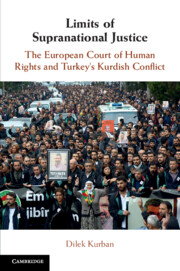Book contents
- Reviews
- Limits of Supranational Justice
- Limits of Supranational Justice
- Copyright page
- Dedication
- Contents
- Acknowledgements
- Interviews
- Abbreviations
- 1 Introduction
- Part I Historical Background
- 2 Human Rights and Democracy under European Watch
- 3 The Kurdish Question in Historical Context
- 4 The Actors, Acts and Victims of State Violence
- Part II Kurdish Lawyers, the Turkish State and the ECtHR
- References
- Table of Cases
- Subject Index
3 - The Kurdish Question in Historical Context
from Part I - Historical Background
Published online by Cambridge University Press: 30 October 2020
- Reviews
- Limits of Supranational Justice
- Limits of Supranational Justice
- Copyright page
- Dedication
- Contents
- Acknowledgements
- Interviews
- Abbreviations
- 1 Introduction
- Part I Historical Background
- 2 Human Rights and Democracy under European Watch
- 3 The Kurdish Question in Historical Context
- 4 The Actors, Acts and Victims of State Violence
- Part II Kurdish Lawyers, the Turkish State and the ECtHR
- References
- Table of Cases
- Subject Index
Summary
The primary indicator of authoritarianism in Turkey has been the treatment of the Kurdish minority. This chapter supports this argument with a historical overview of the evolution of the Kurdish conflict since the late Ottoman era. In response to administrative centralisation and forced cultural assimilation policies pursued by imperial and republican governments, the Kurds resorted to armed uprisings during the single-party era and to peaceful opposition following the transition to a multiparty system. The state responded with further repression in the form of forced displacement, states of exception and special criminal tribunals. This basic dynamic has remained despite the EU- and ECtHR-induced reforms. While Kurdish cultural and linguistic rights have been gradually expanded, the Kurds' political rights are still addressed in the realm of counterterrorism laws. At the same time, Turkey's Europeanisation process opened a new era in Kurdish political mobilisation, enabling the Kurds to lobby European institutions and petition the ECtHR to expand their political and cultural rights on the one hand and expand their electoral representation powers on the other.
Keywords
- Type
- Chapter
- Information
- Limits of Supranational JusticeThe European Court of Human Rights and Turkey's Kurdish Conflict, pp. 79 - 132Publisher: Cambridge University PressPrint publication year: 2020



